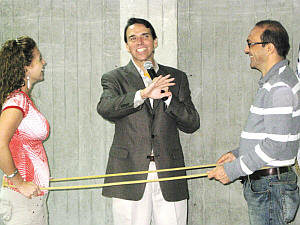 A todos nos encanta una ñapita. Recibir un poco más de lo esperábamos crea emociones que nos hacen sentir maravillosos. Dar una ñapita a nuestros clientes, pacientes, contribuyentes, usuarios, amigos y/o familiares genera dividendos que van mucho más allá de lo que podemos imaginar.
A todos nos encanta una ñapita. Recibir un poco más de lo esperábamos crea emociones que nos hacen sentir maravillosos. Dar una ñapita a nuestros clientes, pacientes, contribuyentes, usuarios, amigos y/o familiares genera dividendos que van mucho más allá de lo que podemos imaginar.
La palabra ñapa viene del lenguaje Quechua y se define como ayuda, aumento o añadidura.  Una ñapita puede venir en forma de un beneficio económico como también de una acción o intención.
Una ñapita puede venir en forma de un beneficio económico como también de una acción o intención.
“Prometer mucho y dar algo más,” es una frase que he tenido presente desde el año 1989 cuando la escuché por primera vez en un taller conducido por Joel Weldon. Cuando logramos cumplir con la promesa de dar un excelente producto o servicio y luego damos un poco más, la competencia que suele ser una pesadilla para los demás se convierte en una fuente de nuevas oportunidades para nosotros.
Para los que han asistido a mis eventos, saben que a menudo entrego una pelota de rebote para afirmar la idea de, “Es el Rebote lo que nos Lleva al Tope.” Esta es “la ñapa” que a mí me encanta dar. Es mi forma de difundir mi mensaje a la mayor cantidad de personas posible. Cuando llegan a su trabajo o a su casa jugando con la pelotita, se puede abrir un espacio para una conversación donde ellos compartan la idea con otros: “Todos podemos rebotar por lo menos una vez más.” He tenido el placer de compartir mis ideas con más de 7,000 personas en diferentes eventos.  ¡Esto significa que hay muchas pelotas rebotando por ahí! Frecuentemente encuentro personas que me preguntan, “Aunque no me acuerdo de tu nombre, tú eres la persona de la pelotita, ¿verdad?”
¡Esto significa que hay muchas pelotas rebotando por ahí! Frecuentemente encuentro personas que me preguntan, “Aunque no me acuerdo de tu nombre, tú eres la persona de la pelotita, ¿verdad?”
Si hay algo que podemos agregar que tiene un valor económico, ¡maravilloso! Si no es el caso, hay muchas maneras que podemos dar una ñapita.
A continuación unos ejemplos:
Ofrecer una idea más de lo que se espera.
Reconocer a todos con una sonrisa sincera.
Utilizar un lenguaje que sea comprensible para todos.
Crear un ambiente positivo siendo abierto y comprensivo.
Aprender y utilizar los nombres de las personas para saludarlas.
Dejar notas y recados indicando lo importante que es una persona para nosotros.
Realmente escuchar lo que nos dicen en lugar de pensar constantemente en lo que vamos a responder.
Llamar a clientes, amigos y familiares en sus cumpleaños, aniversarios y momentos cuando están pasando por desafíos.
Ofrecer un caramelo a las personas que entran a la tienda diciendo, “Este es un regalo para usted. Si puedo ser de utilidad, ¡favor avisarme!”
 Dar un abrazo fuerte cuando sea posible y apropiado. En lo personal, yo necesito por lo menos ocho abrazos al día, ¡solamente para mantenimiento!
Dar un abrazo fuerte cuando sea posible y apropiado. En lo personal, yo necesito por lo menos ocho abrazos al día, ¡solamente para mantenimiento!
El cielo es el límite y la creatividad apremia. Lo importante es hacerles saber a los demás lo valiosos que son porque la necesidad más grande que todos tenemos es que nos valoren y que nos tomen en cuenta. Cuando le damos una ñapita a los demás, le proveemos un regalo extraordinario.
∞ Rob McBride ∞
LL II 17

